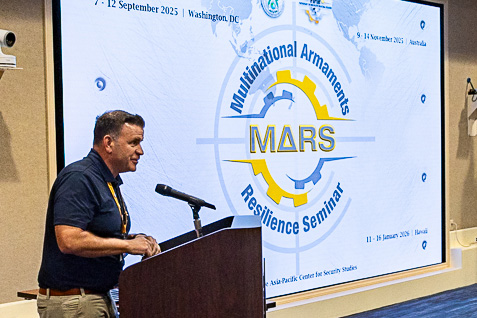In the latest episode of the Security Nexus Webinar, Dr. Srini Sitaraman provided an insightful analysis of India’s 2024 general elections and their implications for the country’s governance and political landscape. Hosted by retired U.S. Army Colonel and Professor James Minnich from the Daniel K. Inouye Asia-Pacific Center for Security Studies (DKI APCSS), the episode delved into critical issues such as coalition politics, governance challenges, economic promises, and the impact of disinformation.
The 2024 elections concluded with Prime Minister Narendra Modi securing his third term, albeit with fewer seats than anticipated. Modi’s Bharatiya Janata Party (BJP) won 240 out of 543 seats in the Lok Sabha, forming a majority with its allies at 292 seats, well short of the 362-seat supermajority sought. This outcome necessitates a more collaborative approach from Modi, who must now navigate coalition politics to maintain governance stability.
During the discussion, Dr. Sitaraman emphasized the profound impact of internal political dynamics within the BJP, noting that the election results have led to significant shifts in the party’s power structure and future strategies. He highlighted the need for the BJP to resonate with local issues and effectively communicate its policies to diverse regional electorates.
The episode also addressed the complexities of coalition politics. Dr. Sitaraman pointed out that managing coalition partners would be crucial for the BJP to implement critical policies and address pressing security concerns. He stressed that coalition governance requires balancing diverse regional demands and ensuring all partners feel adequately represented and satisfied.
Economic challenges were another focal point. The BJP had made bold promises aimed at economic growth, but the reality is more nuanced. With an 8.2% growth rate, India’s economy remains highly unequal, and youth unemployment is a significant concern. Dr. Sitaraman underscored the importance of creating sustainable economic policies that balance ambitious welfare programs with long-term fiscal stability.
Modi’s “New Welfarism” was discussed in detail, highlighting the expansion of welfare programs targeting women and farmers. Initiatives such as cooking gas subsidies, free grain distribution, and direct cash transfers aim to reduce corruption and enhance efficiency. However, the sustainability of these programs remains a concern, as they could strain public finances if not managed properly.
Regional issues also played a significant role in the elections, reflecting the diverse needs and challenges across India’s states. Dr. Sitaraman emphasized the importance of integrating regional priorities into the national agenda to ensure a collaborative development and political harmony. Effective governance must address the specific needs of different regions, from water rights in the south to infrastructure development in the north.
The interview concluded with Dr. Sitaraman offering two book recommendations:
- India, Bharat, and Pakistan: The Constitutional Journey of a Sandwiched Civilization by J. Sai Deepak (Bloomsbury India, 2022)
- India that is Bharat: Coloniality, Civilisation, Constitution by J. Sai Deepak (Bloomsbury India, 2021).
As India navigates these complex challenges, the insights from this episode of the Security Nexus Webinar provide valuable perspectives on the future of the country’s democracy and governance.









Leave A Comment